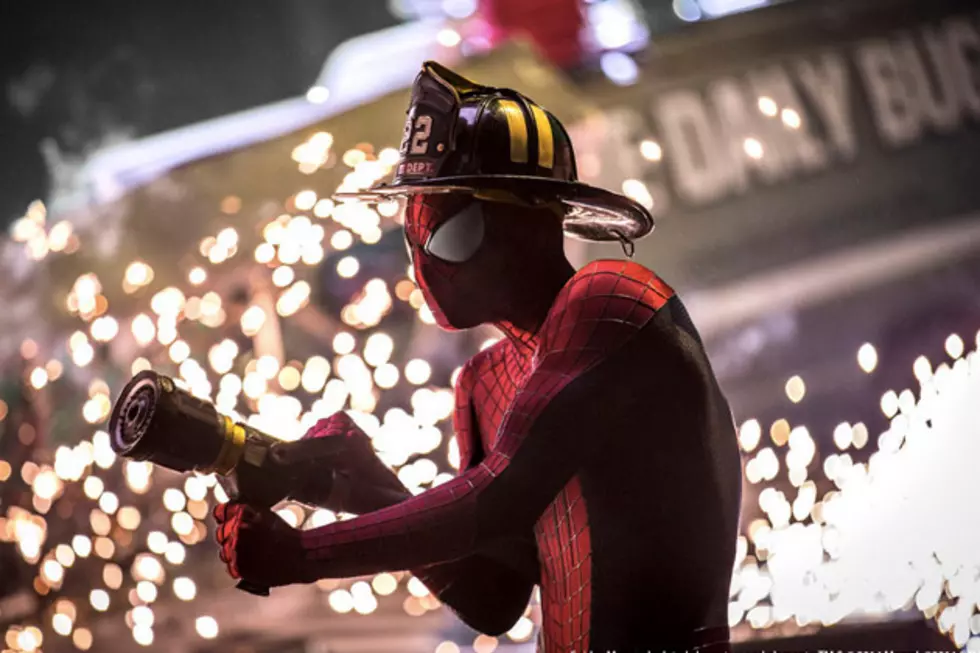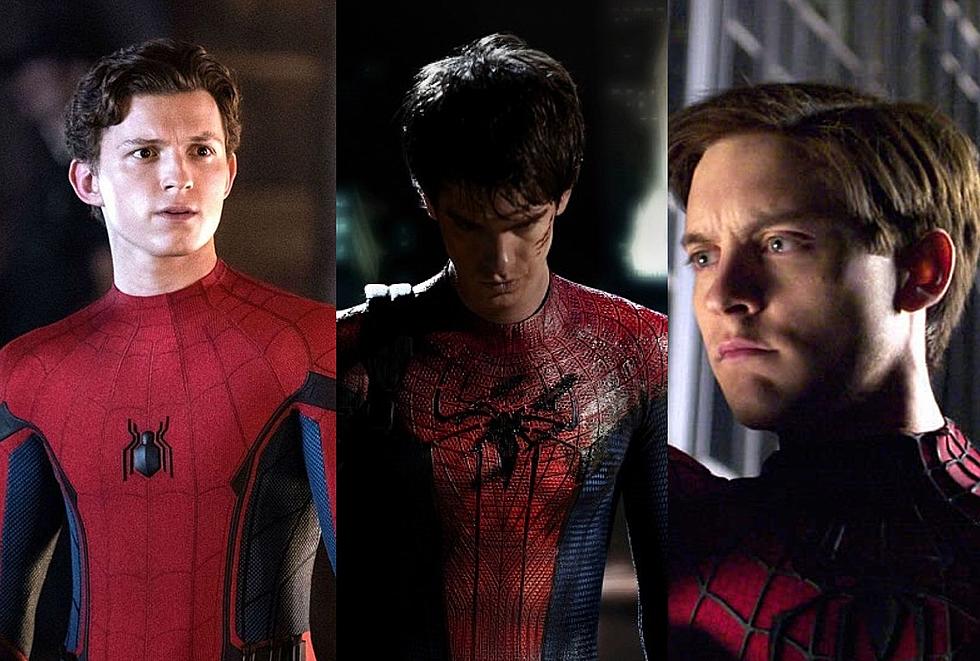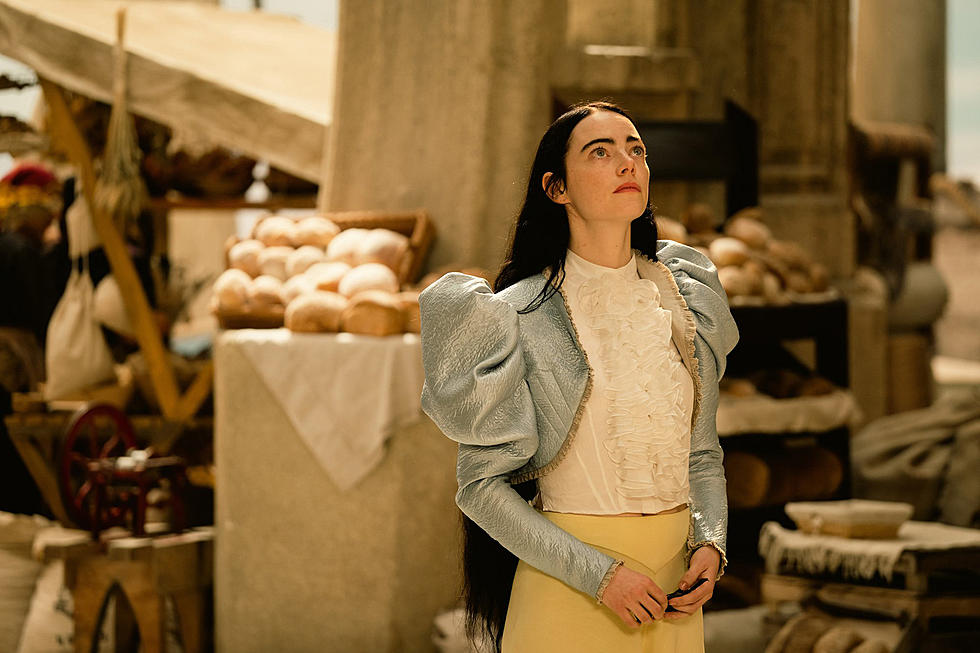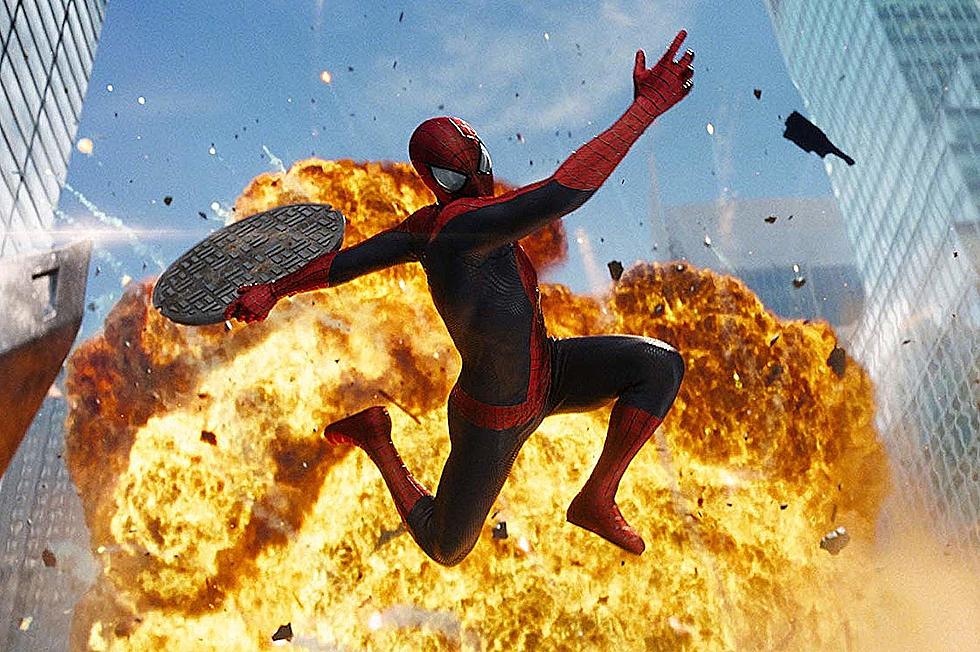
Marc Webb on ‘The Amazing Spider-Man 2,’ the ‘Sinister Six’ Movie and the Future Of J. Jonah Jameson
There's an air of confidence that surrounds Marc Webb that wasn't entirely present when he was doing press rounds for the first 'The Amazing Spider-Man' movie. There's also an air of exhaustion after Webb and his cast's worldwide tout that finally culminated here in New York City. ('The Amazing Spider-Man 2' is already in theaters pretty much everywhere in the world other than the United States.) Talking to Webb this time -- he's certainly not cocky -- but this is a guy who knows that the finished product more resembles the director we first saw with '(500} Days of Summer' as opposed to Webb's first go at Spider-Man, a film that even Webb admits had problems. (To his credit, he still defends his decision to show the Spider-Man origin story.)
'The Amazing Spider-Man 2' picks up shortly after where the first film left off. Peter (Andrew Garfield) is having trouble keeping the promise he made to Gwen Stacy's (Emma Stone) father about keeping his distance. This time around, Spider-Man finds himself pitted against a villain who can absorb and emit electricity (played by a clearly having-the-time-of-his-life Jamie Foxx) and his old friend Harry Osborn (Dane DeHaan) who needs Spider-Man's blood to stay alive.
What's appealing about Webb is that he seems to genuinely enjoy making Spider-Man movies. (As he says ahead, this one more than the last one.) And Webb genuinely gets excited when discussing what's ahead for Spider-Man and the proposed spinoff movies that would feature Spider-Man arch enemies, The Sinister Six, and Venom. I met Webb at his SoHo hotel room -- or, if not his room, the room Sony had him sitting in at that particular moment -- to talk about the future of Spider-Man, what exactly Shailene Woodley's role would have been in the final movie had she not been cut, and Webb offers some, let's say, coy hints at the possible return of J.K. Simmons as J. Jonah Jameson.
From an outsider looking in, you seem like a much more confident guy this press tour than you were during first movie. Is this accurate?
[Laughs] I think probably. I think the first movie was such a massive endeavor and there was a really huge learning curve. This time around, I think all of us made a decision -- Andrew, Emma, Matt [Tolmach], Avi [Arad] -- we all just wanted to have a good time. We worked with Alex Kurtzman to come up with a script and a story -- we all knew what we were running after. And it gave us all a lot of confidence -- and we had been through the pitfalls and the hurdles of the first movie and I think it was the confidence that developed that allowed us to feel liberated and engaged with this on a more playful level, really.
Is that to say you didn't have a good time doing the first one?
[Pauses] It's not that simple. I mean, it's like there are days that were fun and there are days that are hard. And there was an enormous pressure to it. But, there were certainly lots of fun moments in it. But it was just a lot of work and really stressful. And this time around it really was just more fun.
During the first movie, you didn't know your future with the franchise. Now already knowing you're back for the third, does that help?
It wasn't about that. It was about the movie that was in front of us. And I think that, this time around, it really came down to we were all aiming at the same thing. There was an event at the end of the movie -- you've seen the movie, obviously -- and that was kernel. The other thing is, the first movie, I really wanted to re-tell the origin story because I wanted to create a different kind of Peter Parker.
And some people didn't want to see the origin story again.
Some people didn't want to see that. It was kind of a controversial thing -- and I understood exactly why that was, but I felt like it was really important for you to understand and to build up your relationship with that character from the ground up. I believe fundamentally, just in terms of the craft of cinema -- especially in a wish-fulfillment movie where someone like Peter Parker is your emissary and the audience has to connect to him -- you have to experience the A-to-B emotional arc and flow of that character in order to feel the things that you want the audience to feel. And because the inflection of the character was different than what we had seen before, I thought it was actually more important to re-tell those beats. And then people, you know, they love to fling things at you for that kind of thing. But, this time around, we didn't have that obligation.
Was that freeing?
Totally liberating. Also, you know, listen, I made mistakes the first time around. You know, about the costume and I think I shot too much at night. And this time, I was like, "I want to go back to the iconic Spider-Man."
There were a lot of night scenes in the first movie.
There's daytime action, we're going to do the suit the way that it was in some of the comics, and I can go back and embrace the iconography of Spider-Man in a way that wasn't built on separating myself from something.
So did you go back to the first movie and say to yourself, "Here's what people liked and here's what people didn't like"?
Well, there's a learning process, certainly. Every movie is a preparation for the next movie. In a way, it's a school. The first one was a lesson in just how huge the audience is and how vocal the audience is.
'(500) Days of Summer' was very popular, but these movies are a different level.
Yeah, but it wasn't an ongoing relationship. We made that so off the map and people would engage on its own terms. So, that was such a wildly different experience.
Do you think 'The Amazing Spider-Man 2' is a better movie than 'The Amazing Spider-Man'?
Yes.
Is it hard to say that? It's not like your blood, sweat and tears didn't go into the first one, too.
No, you just get better at it. And I think it's the truth. You know, that doesn't mean I don't love parts of that. For example: The relationship between Andrew and Emma -- or Peter and Gwen -- and how it emerged was actually a surprise how well that worked out. And I really have a great affection for that and that's something that I took and I wanted to build upon.
I feel "lucked out" isn't the right term, but boy did you luck out with those two. They have real moments together. And you pulled that off in '(500) Days' as well. You're on quite a streak...
It's the actors. It's not a coincidence.
But there's also "best laid plans."
You dig and dig and dig and you find the actors. Even though we didn't audition Joe [Gordon-Levitt] and Zooey Deschanel, I had seen them in a movie together, 'Manic,' years and years before and I knew they knew each other. And I knew that they could pull that off because I had seen it before. And this, we screen-tested Andrew, then we screen-tested them together before we cast them. And it was [snaps] immediate. And that's something that, you just can't mess around with it. You can find great actors, but if great actors don't have chemistry together, you have nothing. You can't cast actors, you have to cast dynamic. I believe that and I say it time and time again and it's what I said with '(500) Days of Summer.' It goes beyond romance! At a certain point, actors are good enough, like Sally Field for example. Or Jamie Foxx. They can sort of connect with anybody that's around them.
Right, and you just names a couple of Oscar winners there.
Yeah. [Laughs] Exactly. With Chris Cooper...
Another Oscar winner.
Yeah, I know -- Jamie, Sally, Chris, all of these people are open in a very specific way. But, in terms of that romance relationship, certainly it worked out well. And while we were building this movie, we knew where it was going to go, but I could exploit that relationship and explore that in different ways. And I knew I could lean on it within the context of the movie to give it sort of the beating heart it requires.
Last time we spoke you told me about your relationship with J.K. Simmons and watching him perform in dinner theater.
Yeah!
Everyone wants to see him back as J. Jonah Jameson. He said he wants to come back. I know you love him.
Yeah.
And there are hints of him in 'The Amazing Spider-Man 2.' This has to happen, right?
[Laughs] Well, we'll see.
If that happened, people in the theater would applaud.
Yeah.
Who else could possibly play him?
I don't know. Buster Keaton? Audrey Hepburn?
I don't think either of them are available.
Cary Grant might be able to do it.
They're not taking calls these days.
Yeah, that's the problem, isn't it? I've never met him. I would love to work with him someday. I'll just leave it at that.
Now that I've seen this movie, I get why Shailene Woodley's Mary Jane was taken out. It really would only get in the way of Peter and Gwen's story. Though, what exactly was her role supposed to be?
It was just one scene around the montage where she's the next door neighbor. And I think there was another scene with her and Gwen near the end. So it was a minor thing. Super minor. It was just a little like hint.
When did the studio first come to you and tell you they wanted to do a larger universe, like Sinister Six and Venom?
Well, you know what? They didn't come up with that idea. We were messing around. I was talking with Matt and Avi and I think way back in the day -- and this never got back to the people at the studio, we were just talking about it with the producers initially -- like, "You know what would be interesting? To do a whole movie about Richard Parker." Because when you're coming up with backstory for these things, you're looking at the comics, "Oh, there's some interesting things that are going on." Like, with Flash in the comics, he goes to Vietnam. "I wonder if you could take these ancillary characters and make entire small movies out of them. Like Screen Gems, $20 million movies." But, the reality was there's not really enough awareness in the world to make a big thing out of it.
'Spider-Man Origins: Flash Thompson.'
Exactly. Though, Marvel seems to be doing quite well with that. But, then around the beginning of this movie, I had always been interested in the Sinister Six and thinking about them for a possibility with the third movie, just to build that out. Then we were talking about Venom. And then you talk about villain saturation, "Oh, it's too much to put in one movie." And then, maybe it was Amy Pascal who came up with the idea of just like trying to build out that universe a little bit more. And it just kind of made sense. It's not an easy thing to make a villain movie, but Drew Goddard is so smart.
Tough when it's not almost a comedy, or a 'Despicable Me' kind of thing where he really does have a heart of gold.
Yeah! How do you do that? That's a tricky thing. And especially when they'll probably have some ongoing capacity with villains in the future. But, that idea came about near the beginning of this development process, so after the first movie while we were starting to build the second movie.
I was thinking, even if Andrew Garfield isn't in a Sinister Six movie, that doesn't mean Spider-Man can't be in it. If it's from the villain perspective, Spider-Man -- a guy in a suit -- can still be fighting them.
Sure. Right, yeah. There are so many possibilities. I don't have the answers, unfortunately. I wish I did right now. But the possibilities are really compelling and interesting.
Mike Ryan is the senior editor of ScreenCrush. You can contact him directly on Twitter.
More From ScreenCrush









